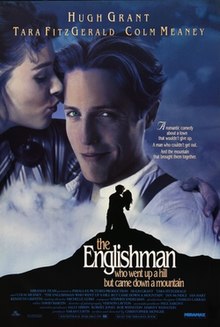The Englishman Who Went Up a Hill But Came Down a Mountain
| The Englishman Who Went up a Hill but Came down a Mountain | |
|---|---|

Theatrical release poster
|
|
| Directed by | Christopher Monger |
| Produced by |
Bob Weinstein Harvey Weinstein Sarah Curtis Sally Hibbin Robert Jones Scott Maitland Paul Sarony |
| Written by | Ifor David Monger Ivor Monger Christopher Monger |
| Starring | |
| Music by | Gwalia Male Choir |
| Cinematography | Vernon Layton |
| Edited by | David Martin |
| Distributed by | Miramax Films |
|
Release date
|
|
|
Running time
|
99 minutes |
| Country | United Kingdom |
| Language | English |
| Box office | $10,904,930 |
The Englishman Who Went up a Hill but Came down a Mountain is a 1995 British film with a story by Ifor David Monger and Ivor Monger, written and directed by Christopher Monger. It was entered into the 19th Moscow International Film Festival and was screened in the Un Certain Regard section at the 1995 Cannes Film Festival.
The film is based on a story heard by Christopher Monger from his grandfather about the real village of Taff's Well (Ffynnon Taf in Welsh), Rhondda Cynon Taff, Wales and its neighbouring Garth Hill. Due to 20th century urbanisation of the area, it was filmed in the more rural Llanrhaeadr-ym-Mochnant and Llansilin in Mid Wales. The Welsh Male Voice Choir used to provide background music throughout the film was, in fact, the London-based Gwalia Male Choir.
The film is set in 1917 (with World War I in the background), and revolves around two English cartographers, the pompous Garrad (Ian McNeice) and his junior, Anson (Hugh Grant). They arrive at the fictional Welsh village of Ffynnon Garw ("Rough Fountain" or "Rough Spring" in Welsh) to measure its "mountain" – only to cause outrage when they conclude that it is only a hill because it is slightly short of the required 1000 feet in height. The villagers, aided and abetted by the wily Morgan the Goat (Colm Meaney) and the Reverend Mr Jones (Kenneth Griffith) (who after initially opposing the scheme, grasps its symbolism in restoring the community's war-damaged self-esteem), conspire with Morgan to delay the cartographers' departure while they build an earth cairn on top of the hill to make it high enough to be considered a mountain.
...
Wikipedia
